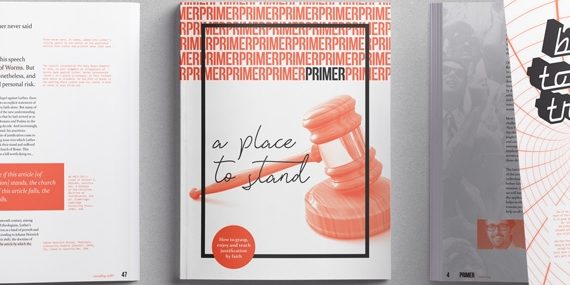
A Place to Stand
 Primer, the journal of FIEC, has released a new issue: “A Place to Stand.” In light of the 500th anniversary of the Reformation, this issue is devoted to the doctrine of justification. Contributors to this issue of Primer include Paul Gibson, Gregg Allison, David Starling, Steve Timmis, as well as Matthew Barrett, executive editor of Credo Magazine.
Primer, the journal of FIEC, has released a new issue: “A Place to Stand.” In light of the 500th anniversary of the Reformation, this issue is devoted to the doctrine of justification. Contributors to this issue of Primer include Paul Gibson, Gregg Allison, David Starling, Steve Timmis, as well as Matthew Barrett, executive editor of Credo Magazine.
David Shaw, editor of Primer, has written a brief introduction to each article. Here is what he had to say about Barrett’s:
Matthew Barrett gives us a bird’s eye view of church history from Augustine to Luther, focussing on the ways in which grace and justification are understood. Along the way we meet some of the key figures – Pelagius, Aquinas, Gabriel Biel – who help make sense of the Reformation. What becomes clear is that the debates are really about human nature. To what extent are we able to win God’s favour or activate his blessing? These are vital issues and Matthew carefully guides us through them.
 Shaw also introduced the topic of justification for the entire issue of Primer:
Shaw also introduced the topic of justification for the entire issue of Primer:
Martin Luther’s introduction to his Commentary on Romans describes it as follows: “It can never be read or pondered on too much and the more it is dealt with, the more precious it becomes and the better it tastes.”
But it’s not all good news. As Luther laments, Paul’s letter has also been “evilly darkened by commentaries and all kinds of idle talk.”
Romans then: delicious, but disputed. And we might say the very same things about the doctrine of justification.
We chose it as a topic for Primer issue 04 because the more it is dealt with, the more precious it becomes and the better it tastes. It is a delicious doctrine, one that speaks to us of a God who justifies the ungodly, who welcomes sinners. And it is a transformative doctrine, inviting us to extend the same welcome to others that we have experienced from God.
But justification is also the subject of all kinds of idle talk and has been evilly darkened over the centuries. For that reason, one of the great slogans of the Reformation was post tenebras lux – “after the darkness, light.”
And so, in this anniversary year, celebrating 500 years since Luther launched the Protestant Reformation, we also want to help churches to understand their roots and to preserve and protect the truth of the gospel. That means understanding the context of the Reformation and it means understanding something of the ongoing debates about justification.
Find out more about Primer and the FIEC today.
